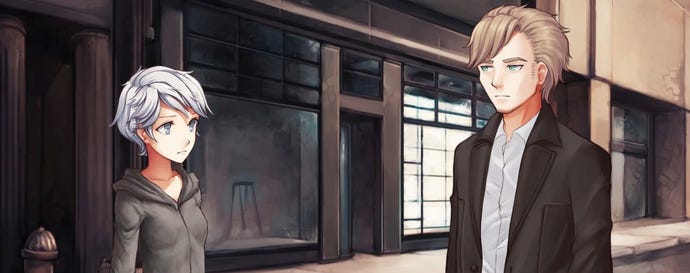JPgamer: A Real Page-Turner
With the Steam release of Dysfunctional Systems: Learning to Manage Chaos, the first pure visual novel to hit Valve's platform, we explore this quintessentially Japanese means of interactive storytelling and what gaming at large could learn from it.
This article first appeared on USgamer, a partner publication of VG247. Some content, such as this article, has been migrated to VG247 for posterity after USgamer's closure - but it has not been edited or further vetted by the VG247 team.
Hello, Japanese gaming fans, and welcome to USgamer's regular exploration of all things Japan and Japan-influenced.
This week, we're going to take a specific, in-depth look at the visual novel medium, a style of game that is immensely popular in Japan but which has often struggled to attain a significant foothold in the West. But the times are a-changing.
A visual novel is exactly what it sounds like: it's a story that you read, like a conventional novel, but it has additional elements, primarily in the form of visual images or animations that accompany the action depicted in the text, but also consisting of music, sound, speech and, more often than not, choices to make that have a significant impact on the outcome of the story.
Quite recently, the medium reached something of a milestone in the West with the release of the first full-blown visual novel on Steam: a title from Dischan Media known as Dysfunctional Systems: Learning to Manage Chaos. It's the first installment in an episodic series that follows Winter Harris, a "student mediator from a Utopian world," and sees Harris shadowing an experienced mediator and attempting to resolve the issues plaguing chaotic other worlds, known as "systems."
The team at Dischan was quite excited about the fact that they're the first "true" visual novel on Steam. But hold on a moment, you might be thinking. What about Christine Love's Analogue series? Or Georgina Bensley's Magical Diary? Didn't they get there first?
"The primary reason for the lack of visual novels on Steam is the belief that they lack sales potential."
Jeremy Miller, Dischan Media
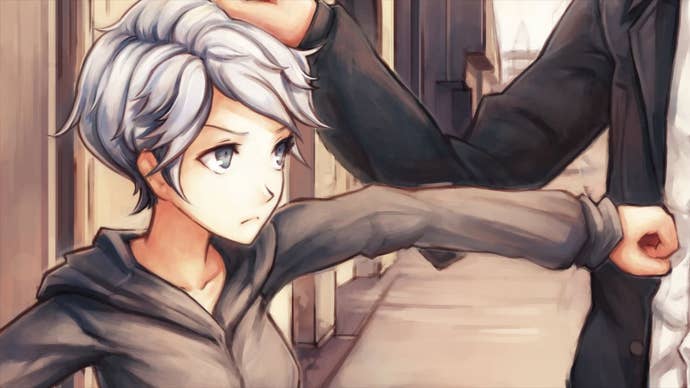
"Analogue, Hate Plus, and Magical Diary make use of traditional gameplay ideas in addition to their visual novel sections," explains Jeremy Miller, director of Dischan Media. "Magical Diary uses an RPG system, and Christine Love's games use a log reading system and some simulated computer management via a neat command line interface. These additions allow for them to be closer to the typical definition of a game, therefore making them much more palatable to the general public. This helps a lot when trying to get on Steam."
To Miller, a big part of why we haven't seen many visual novels on Steam up until now is due to prejudices and misconceptions.
"In my opinion, the primary reason for the lack of visual novels on Steam is the belief that they lack sales potential," says Miller. "Another factor may be that some do not feel like visual novels are technically games, since they don't tend to have much gameplay. Both of these beliefs seem to be fading somewhat." It's true; the growth in popularity and critical acclaim of story-centric, traditional gameplay-light experiences like Gone Home and The Stanley Parable -- not to mention explicitly artistic games like Journey and Flower -- has helped a lot of gamers to realign their expectations of what a "game" is -- it hasn't been about "just having fun" for a long time now.
"I think that mainstream gamers are much more informed about visual novels now than they ever used to be, largely thanks to Katawa Shoujo, which was a freeware visual novel that achieved quite a bit of popularity," says Miller, referring to 4 Leaf Studios' controversial interactive story about a young man adjusting to life in a school for disabled teens. "The most common misunderstanding about visual novels I see is that people think they are something similar to a comic book or graphic novel. I think the best way to spread visual novels is simply to make accessible high-quality examples of them."
"Visual novels have proven themselves to be a fabulous way to tell a story, with amazing visual images and characters and stories of incredible depth."
Peter Payne, JAST USA
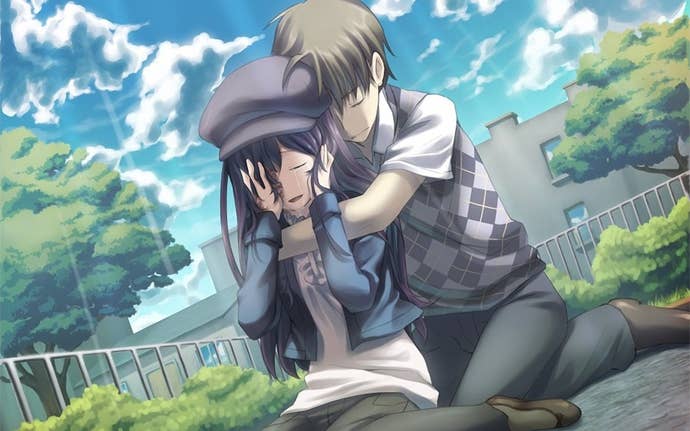
Although Dysfunctional Systems is the first visual novel on Steam to not include traditional gameplay mechanics and instead focus purely on writing and occasional choices, there are a number of companies who have been bringing this kind of experience to Western players for some time now. One of the most enduring, prolific Western visual novel companies is JAST USA, a group that has been localizing a wide variety of visual novels for Western audiences for around 20 years now.
"To my mind, visual novels have proven themselves to be a fabulous way to tell a story, with amazing visual images and characters and stories of incredible depth," says Peter Payne, head and public face of the group of companies that consists of both JAST USA and Japanese culture shop J-List. "For every couple of games about a boy fulfilling his dream harem or exploring some fetish, there are incredible games like Clannad, Fate/Stay Night, Family Project or Yume Miru Kusuri that show how special the genre is. Then there are 'epoch-making' titles like Steins;Gate which are not adult, but firmly entrenched in the hearts of otaku fans."
Many of JAST's titles are of the "adults-only" variety, which most commonly means that they include erotic scenes as part of their narrative -- and also means you'll never see them on brick-and-mortar store shelves. Some titles, clearly designed with titillation and eroticism as a primary goal, focus on the sexual, pornographic aspect, while others integrate sexuality and other adult themes more convincingly into their narrative.
"There's not much difference between a well-written visual novel that has some sex scenes and one that doesn't," ponders Payne. "If you're caught up in the world as you read, an embrace between two characters is as enjoyable as a tender sex scene in an ero title."
"Remember, Japan is not really as it appears to people from the outside. It's distorted by the 'lens of the Internet.'"
Peter Payne, JAST USA
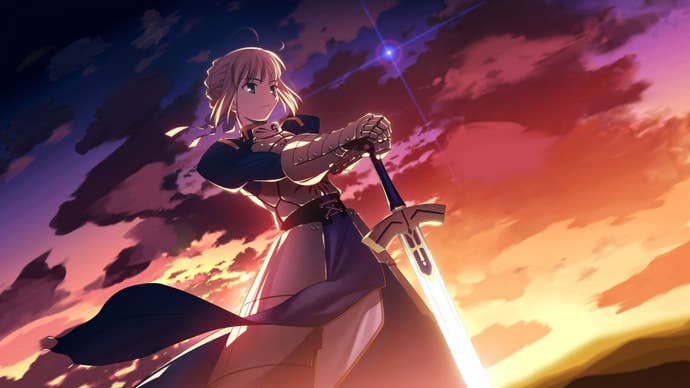
Miller has a more cautious response to the popular -- and at least partly justified -- assumption that a significant proportion of visual novels are sexually explicit.
"Honestly the association between visual novels and porn is completely reasonable to me, seeing as many visual novels contain adult scenes," he says. "It almost seems like many developers feel obligated to insert these scenes, even if they aren't at all relevant to the story or the message they are trying to convey. Similarly to my previous answer, I think the best way to break this perception is to create visual novels which are not pornographic." As you might expect from Miller's answer, while Dysfunctional Systems explores mature themes and concepts in its narrative, it is not pornographic -- it more than likely wouldn't have made it on to Steam if it was.
Payne, as a Westerner who has immersed himself in Japanese culture for many years now, has his own opinions on why we see such a disparity in what Western and Japanese developers are willing to show and explore in their games.
"Japanese people are seen as the most perverted in the world by a lot of people, but the reality is really the opposite, with huge numbers of both males and females being totally inexperienced with dealing with the opposite sex, let alone getting down and dirty in interesting ways," he says. "Actually, the Japanese may be the loneliest people on the planet, with around half of single (unmarried) Japanese aged 18-34 having no girlfriend or boyfriend, and many people in their 30s who have never had sex once. So maybe they explore sex through their pop culture more than we do. Remember, Japan is not really as it appears to people from the outside. It's distorted by the 'lens of the Internet,' just as viewing America through Hollywood movies would distort the result you end up with."
Indeed, recent reports out of Japan paint a somewhat bleak picture of modern relationships in the East: young Japanese people seemingly aren't having sex or even pursuing relationships at all in some cases. Some are calling the accuracy of the data in these reports into question, but Payne does have a point regardless of the data's validity; exploring intimacy and sexuality through popular culture means that young people can investigate the way they feel about matters of love and the libido in a safe, non-judgemental environment without the perceived risks of getting close to other people.
But it's easy to get bogged down in discussion of the sexually explicit nature of many visual novels and ignore the other things the visual novel medium as a whole is doing that other games might perhaps be able to learn from. Payne has plenty of his own suggestions in this regard.
"The best way to spread visual novels is simply to make accessible high-quality examples of them."
Jeremy Miller, Dischan Media
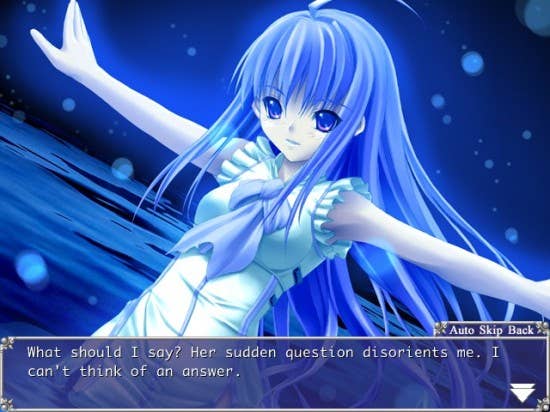
"I've talked with American video game designers at conventions, telling them to play our games and see what ideas they can have for their own titles," he says. "I'm not expecting them to put real sex in their games any time soon, but imagine if more mainstream action games had well-designed game choices, so you could play through a single player game and have six to eight endings, some with romance, some with lost love, others with tragedy, and a 'true route' unlockable only when you'd cleared all the other endings. There's a ton of stuff the West could learn from Japanese visual novels and related games, and no-one is listening."
It's an interesting point; even in Western games that are structurally and mechanically closer to visual novels -- titles like The Walking Dead and David Cage's work -- we tend to be railroaded down a single path with minor deviations along the way rather than branching off into two or more completely distinct pathways with wildly different outcomes, some of which are heartbreaking "bad endings" realized in considerably more depth than a simple "Game Over" screen.
Part of the reason for this is cost, of course -- particularly in the triple-A space, developers and publishers are extremely risk-averse, and investing resources into creating game content that part of the player base might never see if they only play through the game once is something that probably wouldn't be viewed as practical by many producers.
But even in smaller independent titles, there's often only a single route, a single ending, perhaps with minor variations; Gone Home had a number of distinct stories running through it, for example, but regardless of how much you explored each one, the game would only ever end in one way. Even The Walking Dead, a game widely praised for its emphasis on choice and consequence, largely kept you proceeding down the same narrative path regardless of what you chose, albeit perhaps with different supporting characters in tow.
For Payne, cost is an important consideration, but it doesn't have to be restrictive.
"We are very disciplined at controlling our costs and have been able to be profitable selling these fun, wonky games in the West," he says. "Some companies have spent $100,000-$200,000 to port these games, and naturally they don't do well since you can't recover those kinds of costs selling a few thousand copies. A lot of our success is due to the Internet, which allows customers to find us directly rather than trying to rely on shop owners and distributors, all of whom lack vision when it comes to these kind of games. Happily the game side of our business (JAST USA, G-Collections) is aided by J-List, our Japan-based shop, and vice versa." Sometimes all doesn't go quite according to plan, though; "We duplicate our games at a factory in Irvine, California," laughs Payne, "and once the company managed to mix up the masters for duplication. Instead of one of our eroge titles, our customers received a CD of orthodox wedding music in Yiddish, and the customers for that CD presumably for an erotic game. It was a very strange experience."
Visual novels are still a long way off being considered "mainstream" -- and perhaps they never will be -- but there's a lot that more established mainstream gaming could learn from them in terms of structure, thematic content, subject matter and even inclusiveness. And, it seems, in 2013, some developers -- particularly smaller, independent outfits -- are starting to pay attention.
Reading List
Interested in getting to know the visual novel medium but not sure where to start? It's a daunting prospect, for sure, particularly as there are so many titles available and it's not always easy to judge what sort of thing to expect from them. Here's a few of my own personal recommendations to get you up and running, then.
Corpse Party/Corpse Party Book of Shadows (PSP/Vita): It's almost Halloween, so why not freak yourself out with two of the most terrifying games ever created? The original Corpse Party combines the multimedia storytelling of the visual novel medium with top-down RPG-style exploration, while its sequel/spinoff Book of Shadows, which explores a number of prequel and speculative "what if?" scenarios, is closer in execution to a traditional visual novel. Both games have incredible Japanese-language voice acting and wonderful use of sound and music; be sure to wear a good pair of headphones and play in the dark for the full effect.
Sweet Fuse (PSP/Vita): Sweet Fuse is an accessible, fun game that casts you in the role of Keiji Inafune's niece as she attempts to solve the mystery of a pig-faced terrorist attacking her uncle's new theme park. The game's plot is less about romance and more about the thoroughly entertaining, silly and surprisingly touching tales of the characters caught up in this strange situation. It's as ridiculous as it sounds, but plays it completely straight throughout and is all the better for it. Read our review.
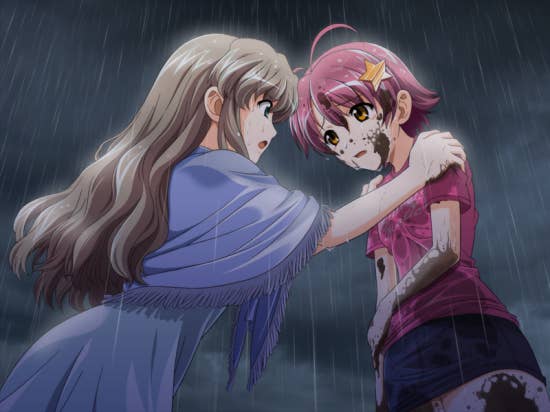
Aselia the Eternal (PC): A combination of visual novel and strategy RPG, Aselia the Eternal features an extremely well-realized fantasy world depicted almost entirely through text and strong characterization. Its tale is an interesting, highly creative one with a wide number of possible outcomes, and its strategy RPG mechanics are unusual, interesting and a lot of fun.
Katawa Shoujo (PC): Worth checking out purely for being the game that made a lot of Westerners aware of the visual novel medium in the first place, Katawa Shoujo tells five emotional, heartfelt stories about living life with various disabilities -- and how these disabilities come to define you considerably less than everything else that is going on in your life at any one time.
Kira Kira (PC): A fun but deep coming-of-age road trip visual novel that explores the lives of four teenagers as they form a band at high school, then take it on tour around Japan. While the game initially appears to set itself up as a light-hearted riff on the K-On! theme, it's much more complex than that, with some deep character explorations and a number of real emotional gutpunches throughout.
Plus, of course, don't forget to check out Dysfunctional Systems on Steam and be sure to support it if you'd like to see more visual novels on the platform.
I hope you've enjoyed this exploration of this quintessentially Japanese style of gaming. Why not share some of your favorite examples from the medium in the comments and notes? I'd love to get some new recommendations of things to read, as, I'm sure, would many other visual novel fans reading.
We'll be back at the same time next week with the usual mix of news and thoughts on Japanese gaming. Mata ne!
